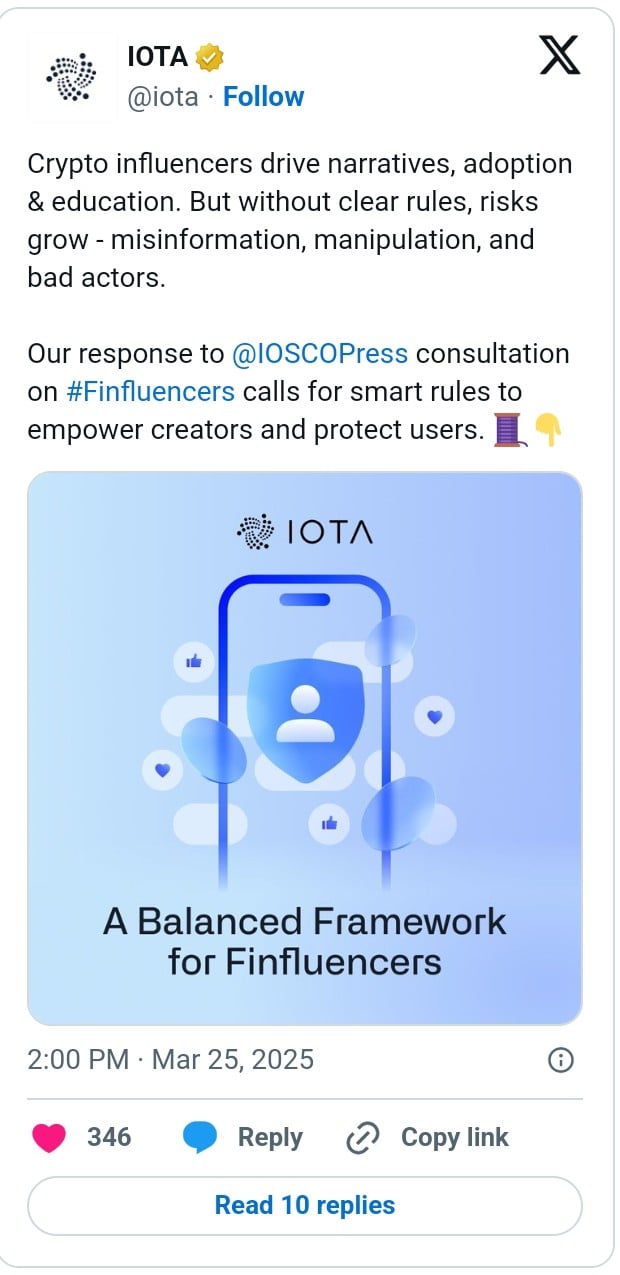- IOTA has released a comprehensive report on the rising number of self-appointed financial experts and how their misguided information could be controlled.
- IOTA proposes an AI-driven monitoring implementation to identify financial misinformation while providing retail investors with tools to guide their decisions.
In a recent consultation report released by the International Organization of Securities Commissions (IOSCO), a series of good practices measures were outlined to combat the rising risk of “so-called financial experts” (finfluencers) imposed on the average retail investors. According to that report, these “self-appointed financial experts” have, through social media, influenced the investment decisions of retail investors, basically the younger generation.
Following this report, several renowned individuals and entities in the crypto space have launched a coordinated campaign against misguided “finfluencers”, calling for a comprehensive regulatory framework to put them in check. According to our research, IOTA is the latest to release a statement to this effect.
Reviewing its position on this discussion, IOTA highlighted how these financial influencers play a crucial role in the crypto space through education and information. Per the post, their ability to break down technical concepts makes them integral contributors to the ecosystem. However, the lack of regulatory framework exposes retailers to their hidden conflicts of interest, misinformation, and market manipulation.

To effectively design a working regulation and control their operations, IOTA proposed that the IOSCO clearly define finfluencers based on their activities and intent. According to them, the focus should be based on those who promote financial products (paid or unpaid). On top of this, it was suggested that the various content formats used by these individuals should be taken note of, and these should include group chats, social media posts, and Livestream.
By capturing the promotional intent rather than just compensation, regulators can ensure that all influential financial content is subject to appropriate rules.
More on IOTA’s Recommendation
According to IOTA, authorities should strengthen oversight and accountability through cross-border cooperation. Most importantly, investors’ education was highlighted as another way to mitigate the risks associated with the financial experts. While finfluencers are encouraged to pursue optional certificate programs to encourage responsible financial communication, retail investors are proposed to be taught how to evaluate financial content.
To enhance good practices, IOTA highlighted four key methods – collaborate with social media platforms to enforce financial disclosure policies, detect financial misinformation through the implementation of AI-driven monitoring, encourage financial institutions to do comprehensive research before engaging with finfluencers, and ensure that a global database of compliant and non-compliant experts are established.
For retail investors, IOTA suggested that they should be equipped with tools to guide their investment decisions. This has become necessary as they largely explore different investment products in the market. As previously mentioned in our report, they make up 85% of Bitcoin ETF holders.
Practical tips include diversifying information sources, cross-checking financial claims, and avoiding emotionally driven investment decisions influenced by finfluencer hype. Importantly, investors should know how to report misleading or fraudulent content to regulators and platforms.
Meanwhile, the UK’s Financial Conduct Authority (FCA) has taken the first step to flag 1,702 illegal crypto ads this year in an attempt to sanitize the ecosystem, as detailed in our last report. Following a similar path, the regulators in New York have also proposed a bill to combat rug pulls and crypto scams, as we discussed earlier.


